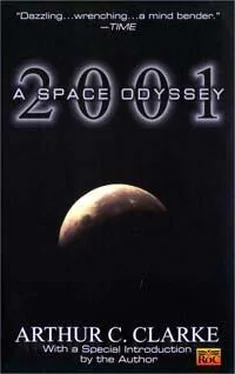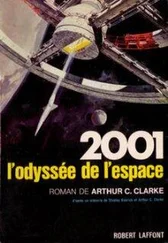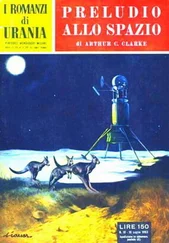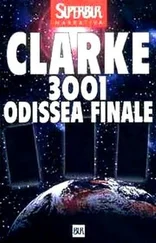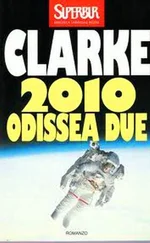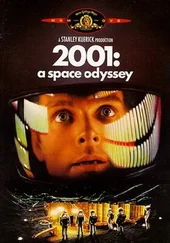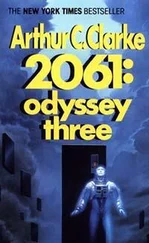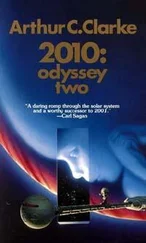Over the radio link with Earth, information was flowing back in a constant stream. They were now so far from home that, even traveling at the speed of light, their signals were taking fifty minutes for the journey. Though the whole world was looking over their shoulder, watching through their eyes and their instruments as Jupiter approached, it would be almost an hour before the news of their discoveries reached home.
The telescopic cameras were operating constantly as the ship cut across the orbit of the giant inner satellites – every one of them larger than the Moon, every one of them unknown territory. Three hours before transit, Discovery passed only twenty thousand miles from Europa, and all instruments were aimed at the approaching world, as it grew steadily in size, changed from globe to crescent, and swept swiftly sunward.
Here were fourteen million square miles of land which, until this moment, had never been more than a pinhead in the mightiest telescope. They would race past it in minutes, and must make the most of the encounter, recording all the information they could. There would be months in which they could play it back at leisure.
From a distance, Europa had seemed like a giant snowball, reflecting the light of the far-off sun with remarkable efficiency. Closer observations confirmed this; unlike the dusty Moon, Europa was a brilliant white, and much of its surface was covered with glittering hunks that looked like stranded icebergs. Almost certainly, these were formed from ammonia and water that Jupiter's gravitational field had somehow failed to capture.
Only along the equator was bare rock visible; here was an incredibly jagged no-man's-land of canyons and jumbled boulders, forming a darker band that completely surrounded the little world. There were a few impact craters, but no sign of vulcanism; Europa had obviously never possessed any internal sources of heat. There was, as had long been known, a trace of atmosphere. When the dark edge of the satellite passed across a star, it dimmed briefly before the moment of eclipse. And in somr areas there was a hint of cloud – perhaps a mist of ammonia droplets, borne on tenuous methane winds.
As swiftly as it had rushed out of the sky ahead, Europa dropped astern; and now Jupiter itself was only two hours away. Hal had checked and rechecked the ship's orbit with infinite care, and there was no need for further speed corrections until the moment of closest approach. Yet, even knowing this, it was a strain on the nerves to watch that giant globe ballooning minute by minute. It was difficult to believe that Discovery was not plunging directly into it, and that the planet's immense gravitational field was not dragging them down to destruction. Now was the time to drop the atmospheric probes – which, it was hoped, would survive long enough to send back some information from below the Jovian cloud deck. Two stubby, bomb-shaped capsules, enclosed in ablative heat-shields, were gently nudged into orbits which for the first few thousand miles deviated scarcely at all from that of Discovery.
But they slowly drifted away; and now, at last, even the unaided eye could see what Hal had been asserting. The ship was in a near-grazing orbit, not a collision one; she would miss the atmosphere. True, the difference was only a few hundred miles – a mere nothing when one was dealing with a planet ninety thousand miles in diameter – but that was enough.
Jupiter now filled the entire sky; it was so huge that neither mind nor eye could grasp it any longer, and both had abandoned the attempt. If it had not been for the extraordinary variety of color – the reds and pinks and yellows and salmons and even scarlets – of the atmosphere beneath them, Bowman could have believed that he was flying low over a cloudscape on Earth.
And now, for the first time in all their journeying, they were about to lose the Sun. Pale and shrunken though it was, it had been Discovery's constant companion since her departure from Earth, five months ago. But now her orbit was diving into the shadow of Jupiter; she would soon pass over the night side of the planet.
A thousand miles ahead, the band of twilight was hurtling toward them; behind, the Sun was sinking swiftly into the Jovian clouds, its rays spread out along the horizon like two flaming, down-turned horns, then contracted and died in a brief blaze of chromatic glory. The night had come.
And yet – the great world below was not wholly dark. It was awash with phosphorescence, which grew brighter minute by minute as their eyes grew accustomed to the scene. Dim rivers of light were flowing from horizon to horizon, like the luminous wakes of ships on some tropical sea. Here and there they gathered into pools of liquid fire, trembling with vast, submarine disturbances welling up from the hidden heart of Jupiter. It was a sight so awe-inspiring that Poole and Bowman could have stared for hours; was this, they wondered, merely the result of chemical and electrical forces down there in that seething caldron – or was it the by-product of some fantastic form of life? These were questions which scientists might still be debating when the newborn century drew to its close.
As they drove deeper and deeper into the Jovian night, the glow beneath them grew steadily brighter.
Once Bowman had flown over northern Canada during the height of an auroral display; the snow-covered landscape had been as bleak and brilliant as this. And that arctic wilderness, he reminded himself, was more than a hundred degrees warmer than the regions over which they were hurtling now.
"Earth signal is fading rapidly," announced Hal. "We are entering the first diffraction zone."
They had expected this – indeed, it was one of the mission's objectives, as the absorption of radio waves would give valuable information about the Jovian atmosphere. But now that they had actually passed behind the planet, and it was cutting off communication with Earth, they felt a sudden overwhelming loneliness. The radio blackout would last only an hour; then they would emerge from Jupiter's eclipsing screen, and could resume contact with the human race. That hour, however, would be one of the longest of their lives.
Despite their relative youth, Poole and Bowman were veterans of a dozen space voyages, but now they felt like novices. They were attempting something for the first lime; never before had any ship traveled at such speeds, or braved so intense a gravitational field. The slightest error in navigation at this critical point and Discovery would go speeding on toward the far limits of the Solar System, beyond any hope of rescue.
The slow minutes dragged by. Jupiter was now a vertical wall of phosphorescence stretching to infinity above them – and the ship was climbing straight up its glowing face. Though they knew that they were moving far too swiftly for even Jupiter's gravity to capture them, it was hard to believe that Discovery had not become a satellite of this monstrous world.
At last, far ahead, there was a blaze of light along the horizon. They were emerging from shadow, heading out into the Sun. And at almost the same moment Hal announced: "I am in radio contact with Earth. I am also happy to say that the perturbation maneuver has been successfully completed. Our time to Saturn is one hundred and sixty-seven days, five hours, eleven minutes."
That was within a minute of the estimate; the fly-by had been carried out with impeccable precision. Like a ball on a cosmic pool table, Discovery had bounced off the moving gravitational field of Jupiter, and had gained momentum from the impact. Without using any fuel, she had increased her speed by several thousand miles an hour.
Yet there was no violation of the laws of mechanics; Nature always balances her books, and Jupiter had lost exactly as much momentum as Discovery had gained. The planet had been slowed down – but as its mass was a sextillion times greater than the ship's, the change in its orbit was far too small to be detectable. The time had not yet come when Man could leave his mark upon the Solar System.
Читать дальше
